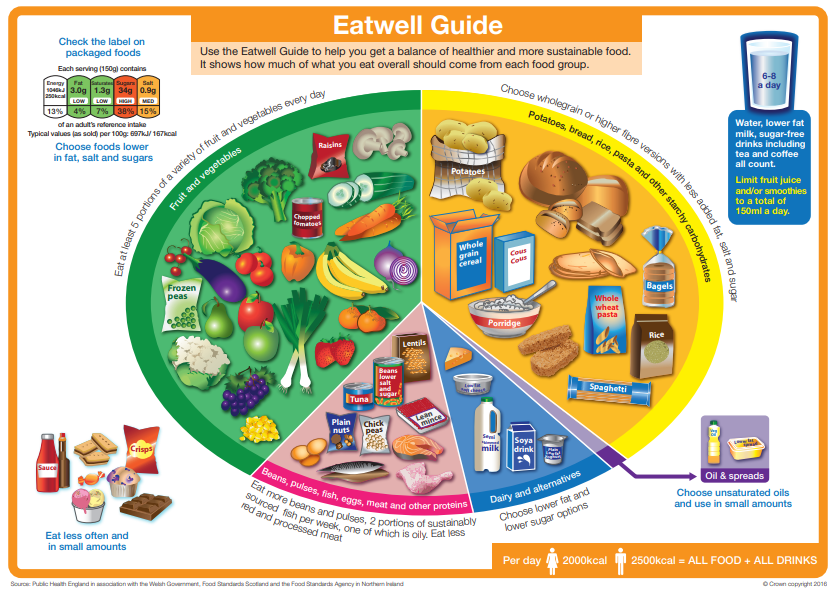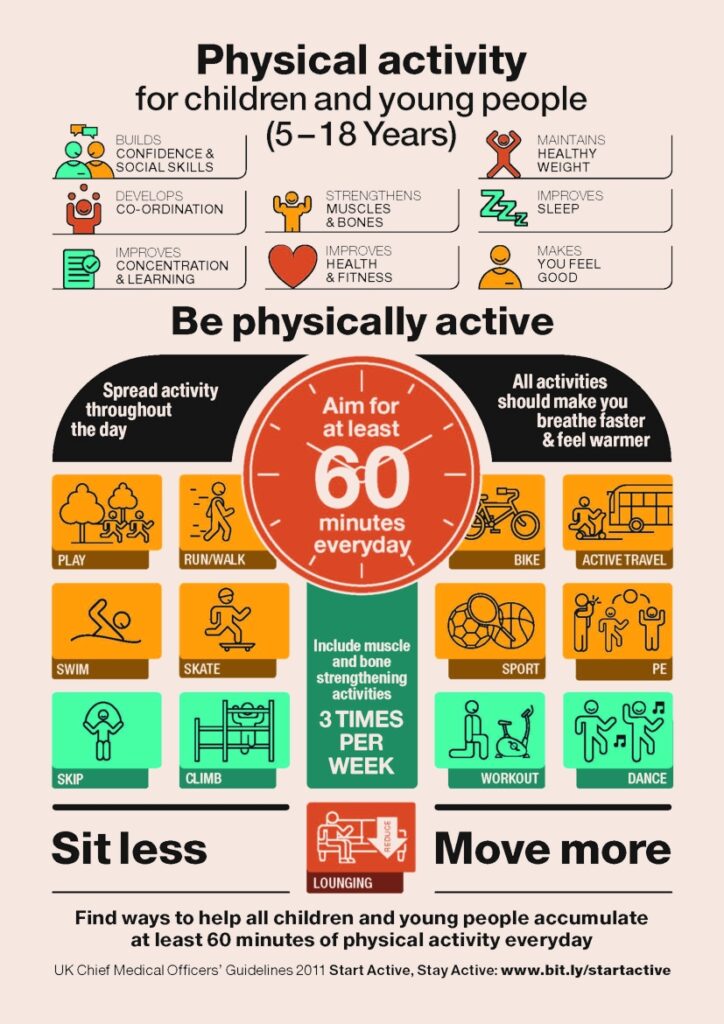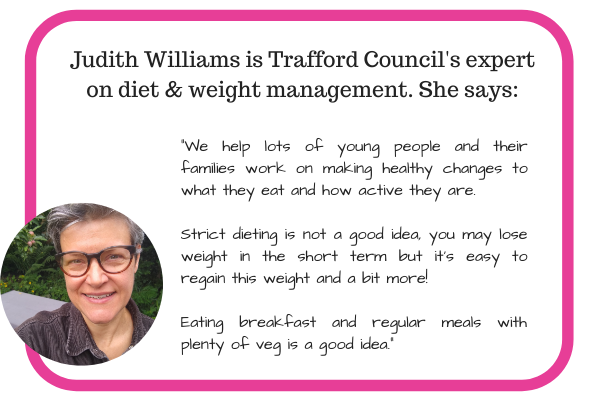Healthy Living: Diet and Fitness
There are many factors involved in keeping yourself healthy.
Skip to our sections here:
- A healthy diet is part of a healthy lifestyle
- Eat right!
- Get moving!
- Remember to sleep!
- A healthy mind
- Where Can You Get Help?
A healthy diet is part of a healthy lifestyle
In terms of having a healthy diet, there is no need to over complicate it and go straight into creating extensive and elaborate meal plans and ideas. But it would be a good idea to plan meals so when you are hungry you don’t just go for the quickest option which might not always be the healthiest.
Start simple by cutting down on the sweets and fizzy drinks. Don’t each too much processed foods, these are foods like ready meals or packaged noodles. And cut down on eating fast foods as they are usually high in saturated fats and salts, which can increase cholesterol.
Instead of having unhealthy snacks like the ones listed above, incorporate healthier alternatives into your diet. Try snacking on some fruit and veg or unsalted nuts or seeds, but make sure you don’t snack too often.
Having a healthy balance in what you eat and how active you are is important for everyone and can help you be a healthy weight. If you think you might be overweight don’t be tempted to go on a crash diet, the truth is they are hard to follow and don’t work long term.
Have a look at these tips for being a healthy weight:
- Don’t skip meals: If you miss meals regularly you may not be getting all the nutrients you need. You may also get so hungry you find it difficult to control what you do eat when you start. Research shows that people who are successful at weight management eat regular meals.
- Get plenty of sleep: It seems getting a good night’s sleep helps us be a healthy weight. Making healthy choices is harder when you’re tired.
- Eat a healthy balance of foods from each food group – see the Eatwell Guide for what this looks like.
- Get active: Do whatever you like as long as it gets you moving. See the infographic below for ideas.
- Don’t give up all your favourite foods: thinking of some foods as banned or forbidden is not helpful – what happens? You just want them more! You can still have a healthy balance and include one small portion of a favourite food.
- Healthy Swaps: There may be healthy alternatives to some foods and drinks that you like. Low calorie and diet drinks are sugar free and a good option, sub roll sandwiches are a good swap for a buger.
- Eat slowly and really think about what you’re eating: It’s easy to eat on autopilot when we’re distracted by phones or TV and not even remember what we’ve had! Try to eat without distractions as this will help you feel more satisfied.
- Get support: Get help from your family, it’s so much easier if you can all be healthy together.
- Set realistic targets: Making small changes you can keep too is the way to go.
Eat right! Have a balanced diet
The Eatwell Guide shows how much of what we eat overall should come from each food group to achieve a healthy, balanced diet.
See the picture below – and there’s more information on the NHS website here: www.nhs.uk/live-well/eat-well/the-eatwell-guide/

Get moving!
Young people should aim for roughly 60 minutes of exercise a day. This does not have to be very intensive exercise; it can even be walking. So perhaps instead of taking the bus to school try walking if you can. Keeping active and moving around is very important as it keeps you at a healthy weight. It lowers the risk of developing certain diseases including obesity, diabetes Type-2 and high blood pressure. Also, it helps you feel happier as endorphins are released into your brain.

Remember to sleep!
In terms of sleep the average teenager needs 9 and a half hours of sleep yet it’s reported that they only get roughly 7 1/2 hours of sleep a night. It’s vital to get enough sleep so you can feel well rested and able to function your best the next day.
If you struggle sleeping there are some tips that can help you improve your sleep, for example make sure you don’t go on your phone too much before bed or watch TV or go on any devices as the light from these devices trick your eyes into thinking it’s daytime and it’ll take you longer to relax and get to sleep.
It might be helpful for you to have a night-time routine as well so this could be self-care looking after your skin or perhaps writing down your feelings in a journal or planning of the next day.
It’s also important to go to your bed at the same time every day and time to wake up at the same time this creates a healthy routine. Make sure you don’t have any caffeine before bed this includes any teas or coffees. Or have a big meal as your body needs time to digest it.
But if you struggle staying asleep this could be due to stress or anxiety. It may help to pre-plan the day before and note down what you have to do, or simply prepare your school bag or your uniform for the next day so you’re not doing so you’re not overwhelmed in the morning.
If it consistently takes you longer than 30 minutes to get to sleep on average or you really struggle staying asleep you may want to consult your GP. They can give you some more tips or perhaps provide you with information as to what is happening.
A healthy mind
As well as your body being healthy you must make sure your mind is healthy too. This means keeping active and having people you can talk to. If you worry that your mental health is poor for example if you’re experiencing:
- Feelings of hopelessness
- Losing interest in the things the you once once enjoyed
- Withdrawal from friends and family
- Feeling low or sad frequently
- Dramatic changes in eating or sleeping
It’s best to talk to your GP or an adult you trust, this could be a parent, a relative or a teacher. To see more about this see our guide to mental health support. Make sure you take care of your mind by why perhaps practicing mindfulness or taking some time out for yourself and not being constantly surrounded by people. Make sure you’re not surrounding yourself by people that have a bad influence on you or make you feel low.
Where Can You Get Help?
- Your School Nurse – Your school nurse can help you with healthy changes to eating and activity. They will also be able to check your height and weight and discuss whether you’re a healthy weight or not.
Used this service? Tell Healthwatch Trafford about it here.
- Children and Young People Healthy Lifestyle Programme – Anyone with a concern about sexual health can see their GP, whether it’s about contraception, periods, STIs, pregnancy, cervical screening, or abortion. People can also speak to their doctor if they want to talk to someone about sex and sexuality. Get in touch with your own GP to make an appointment. You can find GP contact details on Healthwatch Trafford’s website using the link below.
Used this service? Tell Healthwatch Trafford about it here.
- You can get other general advice from:
Change4life campaign has lots of healthy eating and activity ideas https://www.nhs.uk/change4life
Information on healthy eating for young people from the Nutrition Foundation https://www.nutrition.org.uk/healthyliving/lifestages.html
and more from the NHS just for young people: https://www.nhs.uk/live-well/eat-well/healthy-eating-for-teens/
Activity ideas and exercise videos https://www.nhs.uk/live-well/exercise/get-active-your-way/
Check if you’re a healthy weight using the NHS calculator https://www.nhs.uk/live-well/healthy-weight/bmi-calculator/

